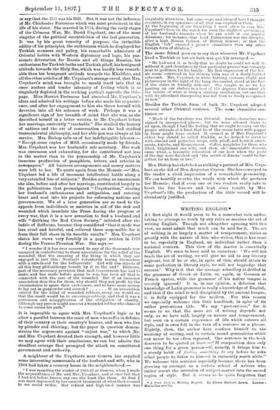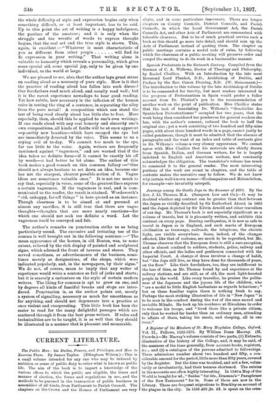WRITING ENGLISH.*
AT first sight it would seem to be a somewhat vain under- taking to attempt to teach by any rules or maxims the art of writing English. Though not altogether agreeing with this view, we must admit that much can be said for it. The art of writing is so largely a matter of temperament, varies so greatly with the nature of him who writes, that it has come to be, especially in England, an individual rather than a national concern. This view of the matter is essentially English. We seem to have said to ourselves : ' We will not teach the art of writing, we will give no aid to any literary aspirant, but if he or she, in spite of this, should attain to some perfection in literary style, we will not begrudge that success.' Why is it that the average schoolboy is drilled in the grammar of Greek or Latin, or, again, in German or French syntax, while the grammar of his native tongue is severely ignored P It is, in our opinion, a delusion that knowledge of Latin grammar is really a knowledge of English, and that if the mind is well disciplined by the ancient tongue, it is fully equipped for the modern. For this reason we especially welcome this little handbook, in spite of its rather pretentious title. We say "pretentious," for it seems to us that the mere art of writing depends not only, as we have said, largely on nature and temperament, but even on a certain experience of life which colours all style, and is even felt in the turn of a sentence or a phrase. Rightly, then, the author here confines himself to the anatomy of writing, and to certain sound generalities which can never be too often repeated. One sentence in the book deserves to be quoted at least :—" If composition does only one thing for a given person—if, namely, it brings him to a sturdy habit of finding something to say before he asks other people to listen to him—it is eminently worth while." We welcome this sentence especially because there has been growing up amongst as a certain school of writers who rather resent the intrusion of subject-matter into the sacred region of style. But it seems to be quite forgotten that • A First Book in Writing English. By Edwin Herbert Lewis. London Macmillan and Co.
the whole difficulty of style and expression begins only when something difficult, or at least important, has to be said. Up to this point the art of writing is a happy indulgence, the pastime of the amateur; and it is only when the struggle and the wrestle of words to express thought begins, that the real art and the true style is shown. This, again, is excellent :—" Whatever is most characteristic of you as different from other people will find its fit expression in your writing." That writing alone is valuable to humanity which reveals a personality, which gives some special aid, some special joy, only to be given by one individual, to the world at large.
We are pleased to see, also, that the author lays great stress on reading aloud as a necessity of pure style. How is it that the practice of reading aloud has fallen into such disuse ? Our forefathers read much aloud, and usually read well ; but it is the rarest experience nowadays to hear good reading. Yet how subtle, how necessary is the inflexion of the haman voice in testing the ring of a sentence, in separating the alloy from the pure metal! A composition which can stand the test of being read clearly aloud has little else to fear. More especially, then, should this be applied to one's own writings. If one reads aloud with any real honesty and sincerity one's own compositions, all kinds of faults will be at once apparent —possibly new beauties—which have escaped the eye but are immediately detected by the voice. This seems to us a crying evil of to-day. We commit too much to the eye, far too little to the voice. Again, writers are frequently cautioned against "vagueness," and are warned that if the idea takes no definite form—if it cannot be exactly hit off by words—it had better be let alone. The author of this book makes a good remark on this common fallacy ;—" One should not always hesitate to set down an idea, because one has not the sharpest, clearest possible notion of it. Vague ideas are sometimes valuable ones." It is not too much to say that, especially in verse, some of the greatest lines express a certain vagueness. If the vagueness is real, and is com- municated to the reader, the result is attained. Wordsworth's "old, unhappy, far-off things" is here quoted as an instance. Though clearness is to be aimed at and pursued at almost any sacrifice, it is still true that there are vague thoughts—thoughts that are more nearly emotions—for which one should not seek too definite a word. Let the vagueness itself be conveyed and felt.
The author's remarks on punctuation strike us as being particularly sound. The excessive and irritating use of the comma is well brought out in the following sentence :—" The mean appearance of the houses, in old Boston, was, to some extent, relieved by the rich display of painted and sculptured signs, which adorned the front of taverns and stores. They served sometimes, as advertisements of the business, some- times merely as designations, of the shops, which were indicated popularly, and, in the newspapers, by their signs." We do not, of course, mean to imply that any writer of experience would write a sentence so full of jerks and starts; but it is scarcely a caricature on the style of certain modern writers. The liking for commas is apt to grow on one, and by degrees all kinds of fanciful breaks and stops are intro- duced. Punctuation is, as the author points out, merely a system of signalling, necessary as much for smoothness as for anything, and should not degenerate into a practice at once violent and exasperating. This little book has been the easier to read for the many delightful passages which are scattered through it from the best prose writers. If rules and technicalities are to be taught, it is as well that they should be illustrated in a manner that is pleasant and memorable.



































 Previous page
Previous page